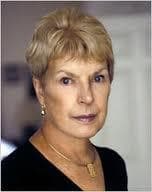Advertisement
Reviews
Crime And Prejudice In The Vine-yard

It probably felt more natural, then, for Vine to write a book within a book based on two generations of a gay man and his sister, an unwed mother, living together. Grace Easton is working on a thesis about unmarried mothers in English literature and is asked to read an unpublished book called “The Child’s Child,” about a young girl born after World War I who’s about to be sent away to have her child after the father skedaddles. Her brother comes up with the idea that the two of them will live together in a remote English village as husband and wife. He, himself, is gay and at first he thinks this will be a good way of keeping him away from partaking in what he sees as a sinful life.
Almost 100 years later, Grace, the narrator, has inherited a large Victorian house with her brother, who’s also gay. He brings a lover, James, home who’s so handsome that “his teeth are like Americans’ teeth and have apparently been looked after by a dentist from Boston.” James is also so into gay rights that he chides Grace for even beginning to think that discrimination against unwed mothers was ever in the same ballpark as anti-gay prejudice.
Vine being Vine, or Rendell, blood is spilled along the way, much of it being directed at contemporary gay men
The problem is that the period drama isn’t nearly as interesting as the contemporary one. The characters are resolutely unlikable, even the gay brother who should be a hero to his sister, but is treated contemptuously by both her and his lover. His inability to stand up to them makes you want to kick him.
Of course, Vine is looking to compare earlier times with ours and some writers have seized on how things aren’t so different now. Vine being Vine, or Rendell, blood is spilled along the way, much of it being directed at contemporary gay men, which perhaps is why some folks see similarities to the past rather than differences.
That’s not, though, what I came away with. It seems to me that Vine rather dispassionately shows how much progress has been made, not in order to pat ourselves on the back but to just take it all in with a smart, anthropological mindset. It’s the march of history, mostly for better when it comes to human rights.
It would have been even smarter if Vine had reversed the ratio and spent two-thirds on contemporary times, which she excels at writing about. At least she ends on the right note, reminding us what a gift she is to English literature, and how lucky we are that she didn’t go in for historical novels.
This program aired on December 28, 2012. The audio for this program is not available.
